Decoding Ecommerce Platform Pricing in 2025
Launching a successful online store, whether on TikTok Shop or another platform, requires a robust ecommerce solution. However, understanding the various pricing structures can be challenging. Choosing the wrong platform can quickly deplete your budget and hinder growth. Conversely, the right platform can boost sales and streamline operations. This guide provides TikTok Shop sellers, ecommerce entrepreneurs, data-driven retailers, and digital marketing professionals with the knowledge to understand ecommerce platform pricing in 2025.
With numerous platforms available, each with its own features, integrations, and pricing models, careful consideration is essential. Do you need a simple, all-in-one solution or a customizable platform that can scale with your business? Are robust analytics and reporting tools necessary to track your TikTok Shop performance? What about transaction fees, app integrations, and the cost of add-ons? These are critical questions to address.
An effective ecommerce platform balances functionality, flexibility, and affordability. Understanding the nuances of each platform's pricing structure—from monthly subscriptions and transaction fees to potential hidden costs—is crucial for maximizing your ROI. This guide examines factors influencing pricing, including hosting, security, support, and features like marketing automation and inventory management.
Key Pricing Factors to Consider
We will explore how these factors impact your bottom line, empowering you to make data-driven decisions, whether you are a beta tester or a seasoned ecommerce veteran. Some key factors include:
- Monthly Subscriptions: Many platforms charge a recurring monthly fee based on the features and services offered.
- Transaction Fees: A percentage-based fee is often charged per sale, impacting profit margins.
- Add-on Costs: Essential features like email marketing or advanced reporting may come at an additional cost.
- Integration Fees: Connecting with other platforms or tools, such as your TikTok Shop, might involve additional fees.
By the end of this article, you will be equipped to confidently select the platform that best aligns with your business needs and budget, setting the stage for sustainable ecommerce success.
1. Shopify

Shopify is a prominent all-in-one eCommerce platform. It's a popular choice for businesses of all sizes, from individual entrepreneurs launching on TikTok Shop to well-established data-driven retailers. Its varied features and tiered pricing plans accommodate diverse needs and budgets.
Shopify offers three primary pricing tiers: Basic ($39/month), Shopify ($105/month), and Advanced ($399/month). Each plan includes essential features:
- Website and blog
- Unlimited product listings
- 24/7 support
- Access to various sales channels, including integrations for TikTok Shop sellers
Higher tiers unlock lower transaction fees, more detailed reporting, and more staff accounts. This scalability makes Shopify suitable for growing businesses. For example, a new TikTok Shop seller might begin with the Basic plan and upgrade to the Shopify plan as sales and their team grow.
One of Shopify's key strengths is its user-friendly interface. Even users with limited technical skills can build and manage an online store. Its app marketplace, featuring over 6,000 integrations, allows businesses to add features such as email marketing with services like Mailchimp, advanced analytics tools like Google Analytics, and custom shipping solutions. This flexibility is a major advantage for data-driven retailers and digital marketing professionals.
The platform's responsive themes ensure mobile optimization, essential in today's mobile-centric shopping environment. Multi-channel selling features seamlessly integrate with platforms like TikTok Shop, expanding reach and potential customer base.
You might be interested in: Our Complete Sitemap for more eCommerce resources.
Pros and Cons of Using Shopify
Here's a quick rundown of the advantages and disadvantages:
Pros:
- User-friendly interface: Easy for both beginners and experienced users.
- Comprehensive all-in-one solution: Covers hosting, website building, payment processing, and more.
- Excellent uptime and reliability: Minimizes disruptions for a smooth customer experience.
- Strong app ecosystem: Offers extensive customization options.
Cons:
- Additional transaction fees: Apply when not using Shopify Payments, potentially affecting profit margins.
- Advanced customizations often require paid apps: Can increase overall costs.
- Monthly costs can accumulate: Especially with premium apps and themes, requiring careful budgeting.
Shopify’s ease of use, extensive app ecosystem, and reliable hosting make it a great option for eCommerce entrepreneurs and TikTok Shop sellers. While the cost of premium apps and transaction fees are factors to consider, its features and scalability provide a robust platform for businesses to establish and grow their online presence. Visit the Shopify website for details.
2. WooCommerce
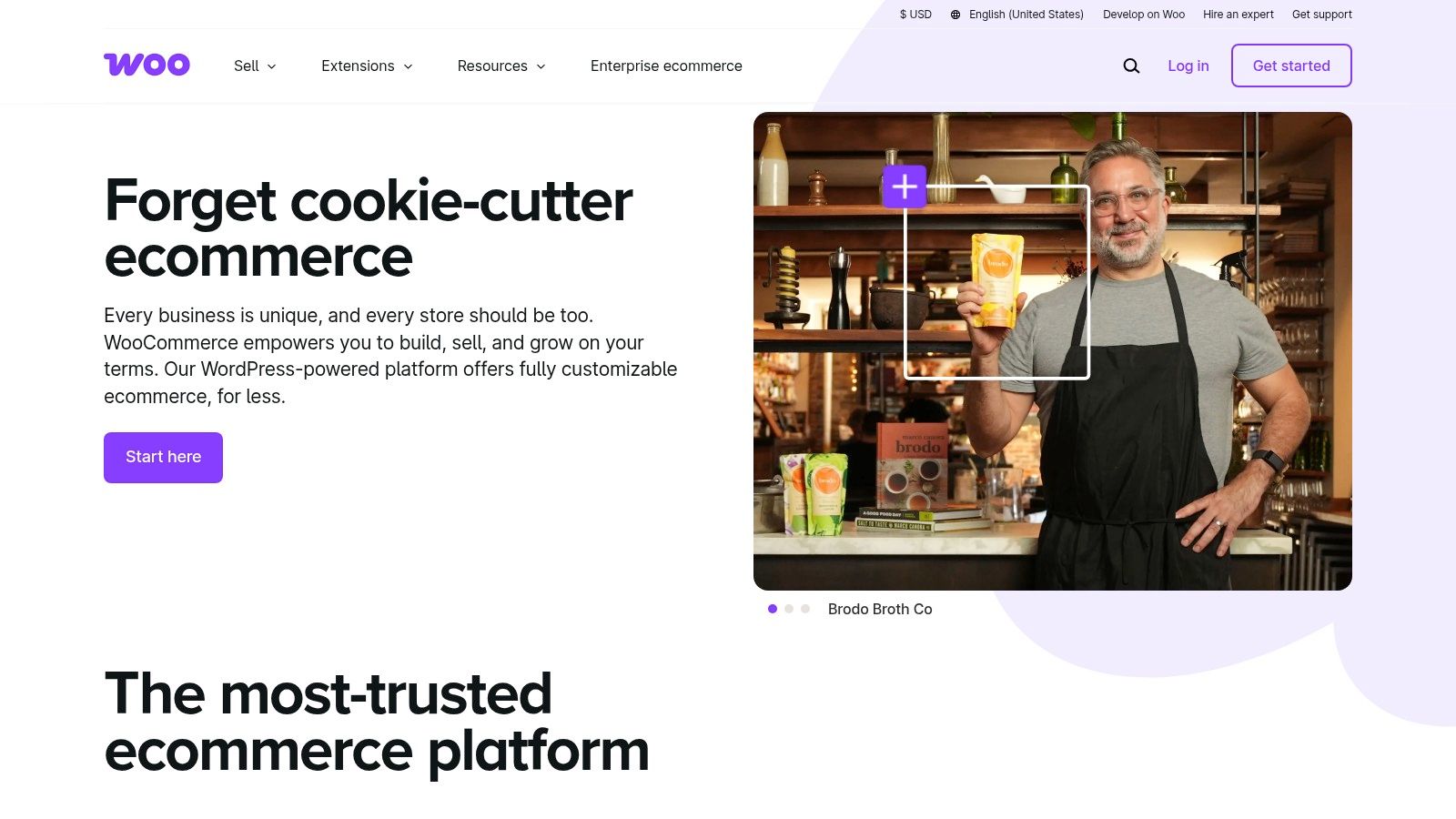
WooCommerce stands out for its open-source nature and flexibility, making it a strong choice for eCommerce entrepreneurs, especially those already working with WordPress. While hosted platforms offer convenience, WooCommerce gives you detailed control over your online store. This is a key feature for data-focused retailers and digital marketing professionals who want to optimize every part of the customer journey.
At its heart, WooCommerce is a free plugin that integrates with WordPress, turning your website into a fully functional online store. With this free core plugin, you can list unlimited products and categories, a real plus for businesses with large inventories. However, the "free" aspect requires careful thought.
While the core software is free, other costs can add up. You will need hosting (typically $5-$300/month, depending on traffic and storage), domain registration ($10-$20/year), and possibly premium themes ($0-$200) for a better storefront look. The main expense for many WooCommerce users is its extensive library of extensions.
These plugins, costing anywhere from $0-$300 each, add features like advanced shipping calculations, subscription services, and marketing integrations. This modular setup lets you choose only the features you need, but the costs can rise as your store grows.
WooCommerce for TikTok Shop Sellers
For TikTok Shop sellers wanting to expand beyond the platform and build a stronger brand, WooCommerce offers a robust solution. Its flexibility allows integration with various marketing tools, enabling campaign tracking and data analysis. Early adopters and eCommerce entrepreneurs will value the ability to quickly test and launch new features due to its open-source nature and large developer community.
Features
- Free core plugin with open-source flexibility
- Seamless integration with WordPress
- Extensive library of free and premium extensions
- Complete control over hosting and data
- Unlimited products and categories
Pros
- No monthly fees for the core platform
- Highly customizable and flexible
- Large community and developer ecosystem
- Complete ownership of your store and data
Cons
- Requires separate hosting and maintenance
- Can become expensive with premium extensions
- Steeper learning curve compared to hosted platforms
- Security and updates must be managed manually
Implementation Tip
Before starting with WooCommerce, assess your technical skills and available resources. While powerful, it demands more hands-on management than hosted solutions. If you are comfortable managing WordPress, hosting, and updates, WooCommerce can be a very effective platform. You might find helpful resources on our Full Blog Sitemap.
Website
3. BigCommerce
BigCommerce is a powerful ecommerce platform designed for scalability, making it an attractive choice for TikTok Shop sellers, data-driven retailers, and online entrepreneurs seeking growth. Its tiered pricing structure, much like Shopify, provides increasing features and sales limits as your business grows. This makes BigCommerce especially appealing for businesses anticipating rapid expansion and needing a platform that can handle higher sales volumes without incurring significant costs for core features.
Pricing and Plans:
- Standard ($39/month): This plan is well-suited for startups and small businesses with annual sales up to $50,000.
- Plus ($105/month): The Plus plan is designed for growing businesses with annual sales up to $180,000. It unlocks features like customer segmentation and abandoned cart saver.
- Pro ($399/month): This plan caters to high-volume businesses with annual sales up to $400,000. It includes advanced features like product filtering and custom SSL.
- Enterprise (Custom Pricing): The Enterprise plan is tailored for large businesses with high sales volumes and complex requirements.
Key Features and Benefits:
BigCommerce distinguishes itself with its comprehensive approach, including many features that often require paid apps on other platforms like Shopify. This can lead to substantial cost savings, particularly as your business scales. Some key built-in features include:
- Robust Reporting & Analytics: Gain valuable insights into your sales data, customer behavior, and marketing performance without needing external analytics tools.
- Built-in SEO Tools: Optimize your product listings and content for search engines with integrated SEO features, a significant advantage for attracting organic traffic.
- Abandoned Cart Recovery: Recover lost sales with automated email sequences targeting customers who abandoned their carts.
- Multi-Channel Selling: Expand your reach beyond your online store by selling across various marketplaces like TikTok Shop, Facebook, and Instagram.
- Unlimited Products, Bandwidth, and Staff Accounts: Scale your business without concerns about product listing limits, website traffic, or team access.
Pros:
- No Transaction Fees: BigCommerce doesn't charge transaction fees, regardless of your payment gateway.
- Comprehensive Feature Set: The platform's extensive built-in functionality reduces the need for paid apps.
- Strong SEO Capabilities: Boost your online visibility and drive organic traffic with powerful built-in SEO tools.
- Enterprise-Grade Performance and Security: Enjoy reliable hosting and robust security features.
Cons:
- Sales Threshold Limits: The tiered pricing structure, while scalable, may necessitate plan upgrades as your sales increase.
- Smaller App Marketplace: While built-in features are extensive, the app marketplace offers fewer specialized integrations compared to platforms like Shopify.
- Steeper Learning Curve: BigCommerce can be slightly more challenging for beginners to navigate than some other platforms.
Implementation Tips:
- Start with a trial: Explore the platform before subscribing to a paid plan.
- Plan your migration: If transitioning from another platform, carefully plan your data migration.
- Utilize BigCommerce University: Take advantage of BigCommerce's resources and training materials.
Why BigCommerce Deserves Its Place on This List:
BigCommerce offers a powerful and scalable ecommerce solution with excellent value. Its comprehensive features, robust SEO capabilities, and absence of transaction fees make it a compelling option for growing businesses, data-driven retailers, and those focused on multi-channel selling, including TikTok Shop. If you need a platform that can handle significant growth and provides advanced features out-of-the-box, BigCommerce is a strong contender.
4. Magento (Adobe Commerce)
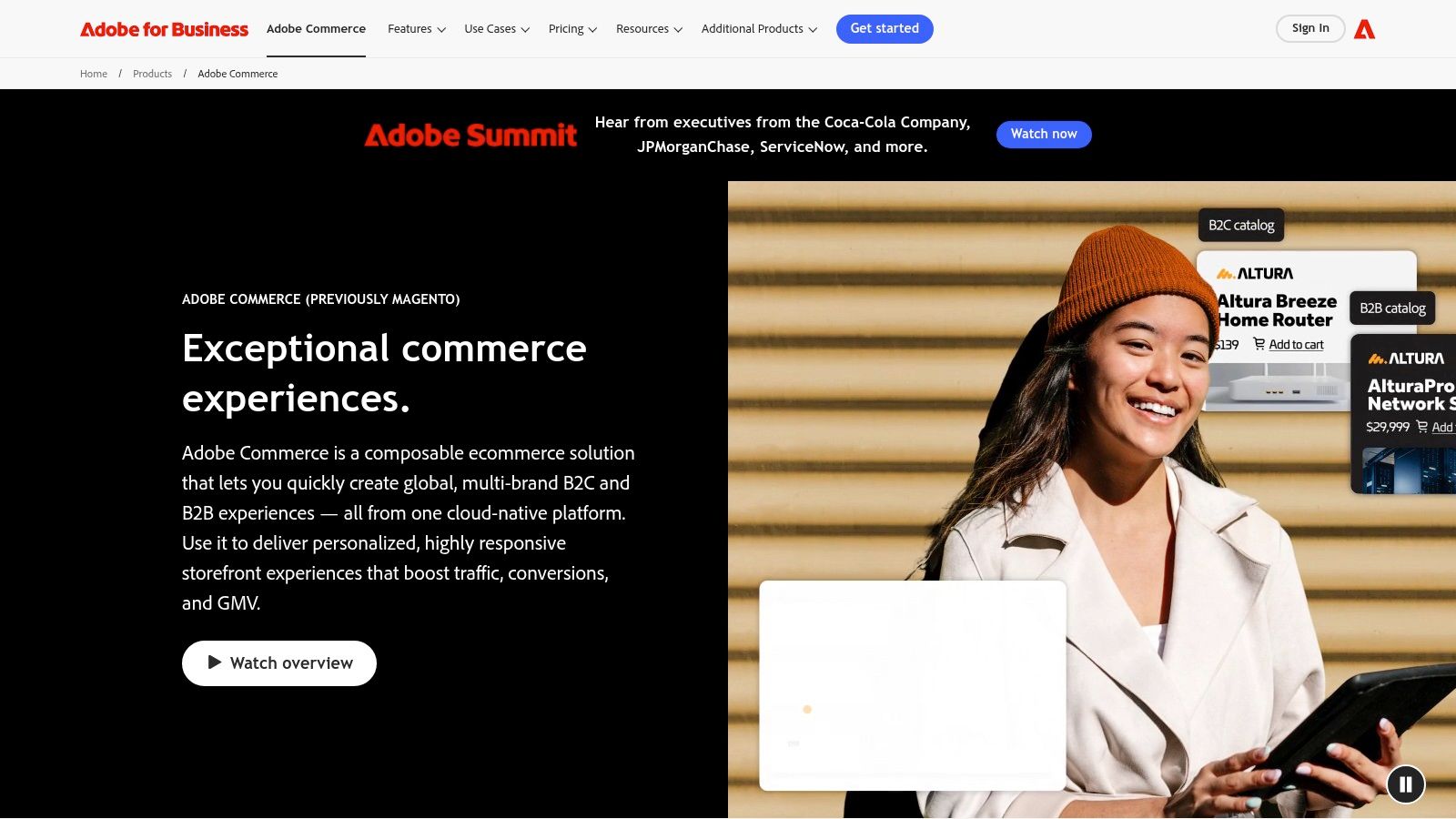
Magento, now known as Adobe Commerce, is a powerful and highly customizable ecommerce platform. While suitable for businesses of all sizes, its robust features make it especially well-suited for mid-size to large enterprises and those with complex needs. It's available in two primary versions: Magento Open Source and Adobe Commerce.
Magento Open Source is free to use, but significant costs are associated with implementation. Development can range from $15,000 to $100,000+, with additional expenses for hosting ($500-$5,000/month), ongoing maintenance, and potential extensions.
Adobe Commerce, the enterprise edition, starts at approximately $22,000/year. This licensing fee provides access to advanced features designed for larger businesses and complex operations. These include B2B functionality, content staging, visual merchandising, and dedicated support from Adobe. For data-driven retailers and digital marketers, Magento's detailed analytics and reporting offer valuable insights for optimizing sales strategies and campaigns.
Magento's flexibility and scalability justify its inclusion in this list. It offers highly customizable architecture for complex business needs, surpassing the capabilities of many other platforms. Advanced product management, including robust B2B functionality in Adobe Commerce, and the ability to manage multiple stores from a single backend make it a powerful tool for established brands. This enterprise-level scalability and performance allow it to handle high-volume transactions efficiently, even during peak seasons.
Features
- Highly customizable architecture for complex business needs
- Advanced product management capabilities
- Robust B2B functionality in Adobe Commerce
- Multi-store management from a single backend
- Enterprise-level scalability and performance
- Strong international selling capabilities
Pros
- Unmatched flexibility for custom ecommerce experiences
- Powerful features for complex catalog management
- Handles high-volume transactions efficiently
- Strong international selling capabilities
Cons
- Significantly higher cost of ownership
- Requires specialized Magento developers for implementation and maintenance
- Longer implementation timeline compared to simpler platforms
- Complex administration requiring technical expertise
For eCommerce entrepreneurs and TikTok Shop sellers looking to scale rapidly, Magento's power might be excessive initially. However, if you anticipate significant growth and require a platform that can handle complex requirements and high transaction volumes, Magento is worth considering. Check out our article about Post Tag for more insights into optimizing your ecommerce strategies.
Implementation Tip
Plan your Magento implementation thoroughly. Engage experienced Magento developers early to ensure a smooth transition and avoid costly rework. Clearly define your requirements and budget upfront to prevent scope creep and unexpected expenses.
5. Wix eCommerce
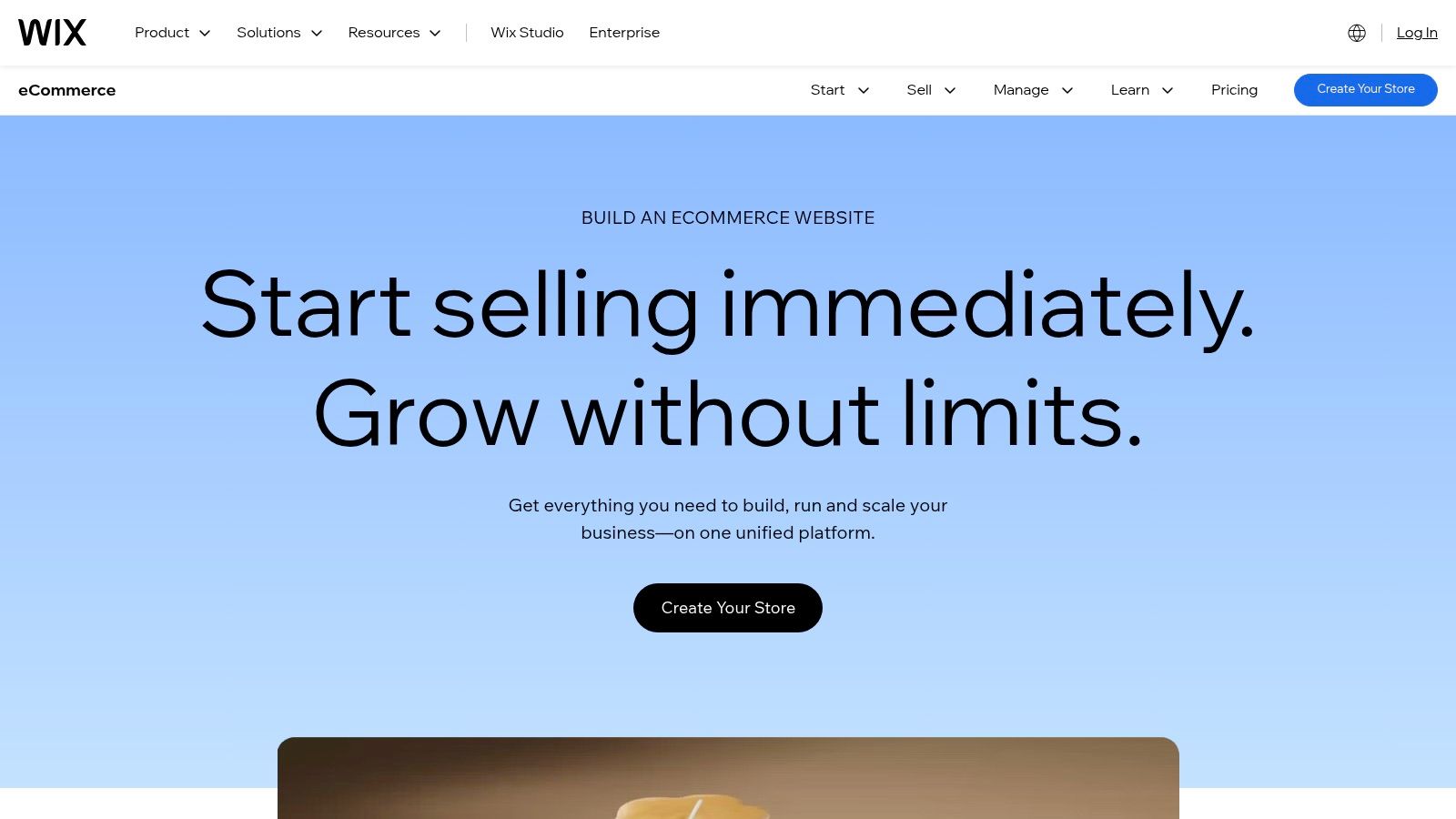
Wix eCommerce is a popular choice for online businesses, particularly those new to eCommerce, like TikTok Shop sellers. Its appeal comes from its simplicity and all-in-one platform. The drag-and-drop interface removes the need for coding, allowing anyone to build a professional online store.
Wix offers eCommerce functionality through its Business & eCommerce plans. These plans cater to different needs and budgets.
Wix eCommerce Plans
Let's take a closer look at each plan:
-
Business Basic ($27/month paid annually): The Business Basic plan is ideal for getting started. It offers essential features like secure online payments, customer accounts, unlimited products, and abandoned cart recovery.
-
Business Unlimited ($32/month paid annually): Building upon the Basic plan, Business Unlimited adds automated sales tax calculations – a vital asset for data-driven retailers. It also includes more advanced shipping options for growing businesses.
-
Business VIP ($59/month paid annually): The Business VIP plan unlocks additional features like subscription sales, perfect for recurring revenue models. You'll also receive priority customer support.
Importantly, all Wix eCommerce plans boast 0% commission fees, helping you maximize profit margins. This is a key advantage for TikTok Shop sellers focused on profit tracking.
Key Features for Online Sellers
Wix offers several features designed for today's online sellers:
-
Drag-and-drop website builder with visual editing: This intuitive builder simplifies design, enabling even non-technical users to create attractive storefronts.
-
500+ designer templates with mobile optimization: Choose from a vast library of professionally designed templates. These templates are also mobile-optimized, crucial for reaching TikTok's mobile audience.
-
Built-in marketing tools and SEO features: These tools are essential for digital marketing and driving organic traffic to your store.
-
Integrated booking and appointment systems: This feature is valuable for businesses offering services in addition to products.
-
Multilingual site capabilities: Expand your reach to international customers and access new markets.
Pros and Cons of Wix eCommerce
As with any platform, Wix has its strengths and weaknesses.
Pros:
- User-friendly interface: Wix is known for its ease of use, making it perfect for beginners.
- All-in-one solution with hosting included: Setup and management are simplified, saving you time and resources.
- No coding required: This makes eCommerce accessible to everyone, regardless of technical skill.
- Design flexibility: Customize your store to match your brand and create a unique online presence.
Cons:
- Scalability: Wix is suitable for small to medium-sized businesses but may not be ideal for large enterprises with extensive catalogs or complex fulfillment needs. Consider Shopify for larger operations.
- Limited migration options: Moving your store to another platform can be difficult.
- Fewer advanced eCommerce features: While Wix offers a good range of features, dedicated platforms like Shopify or BigCommerce might offer more advanced functionality.
Implementation Tips
Here are a few tips to get started with Wix:
- Start with a template: Use Wix's templates as a foundation for your design.
- Utilize the built-in marketing tools: Explore Wix's SEO and marketing features to boost sales.
- Consider future growth: While Wix is excellent for starting, keep in mind its scalability if you anticipate significant growth.
Website: Wix eCommerce
Wix provides a user-friendly and accessible platform for creating and managing your online store. Its intuitive interface, comprehensive features, and affordable pricing make it a great choice for eCommerce entrepreneurs, TikTok Shop sellers, and data-driven retailers. Remember to consider its scalability as your business grows.
6. Squarespace Commerce

Squarespace Commerce earns its place on this list thanks to its simplified approach to creating visually appealing online stores. This makes it especially attractive to businesses prioritizing aesthetics and those just starting out in ecommerce. It's a fantastic option for entrepreneurs who value design and user-friendliness, particularly those active on platforms like TikTok Shop where visual presentation is key.
Squarespace provides ecommerce functionality across three different pricing tiers:
-
Business ($33/month billed annually): This plan offers basic ecommerce features, but includes a 3% transaction fee. It's suitable for testing the market, but becomes less cost-effective as your sales grow.
-
Basic Commerce ($36/month billed annually): This tier removes transaction fees and provides features such as customer accounts, checkout on your own domain, and ecommerce analytics. This is a good starting point for established ecommerce businesses.
-
Advanced Commerce ($65/month billed annually): This plan offers advanced features like subscriptions, advanced shipping options (including real-time carrier rates), and sophisticated discounts. It's designed for growing businesses with more complex requirements.
Features
Here’s a closer look at what Squarespace Commerce has to offer:
-
Award-winning designer templates and layouts: A core strength of Squarespace, these templates provide a polished, professional appearance with minimal effort. This is a significant advantage for visually-driven brands and TikTok Shop sellers.
-
Integrated point of sale for omnichannel selling: Connect your online store with a physical location, creating a consistent brand experience across all channels. Data-driven retailers can use this for streamlined sales tracking and inventory management.
-
Built-in tax tools and shipping label printing: These tools simplify administrative tasks, freeing up time for other business operations.
-
Inventory management and low stock alerts: This feature helps prevent stockouts and ensures efficient order fulfillment.
-
Subscription and recurring payment support (Advanced Commerce): Perfect for businesses offering subscription boxes or memberships.
Pros
-
Exceptional design aesthetics and templates: Create a visually engaging online store that reflects your brand identity.
-
All-inclusive platform with hosting and security: Streamlines setup and maintenance, minimizing technical burdens.
-
Strong blogging and content features: Enhance your online presence with integrated content marketing tools. These are especially helpful for driving organic traffic and engaging customers.
-
Intuitive interface with minimal learning curve: Easy to navigate and use, even for beginners.
Cons
-
Limited customization compared to open-source platforms: Less flexibility for highly specialized features.
-
Fewer integrations and extensions than competitors: May require workarounds for certain requirements.
-
3% transaction fee on Business plan: This makes this plan unsuitable for high-volume sales.
-
Less suitable for complex or large-scale stores: May not offer the necessary scalability for very large inventories or complex order processing.
Implementation Tips
-
Start with a trial: Explore the platform and experiment with different templates before selecting a plan.
-
Optimize your product images: High-quality visuals are essential for presenting your products, particularly for TikTok Shop audiences.
-
Leverage the blogging features: Create engaging content related to your products and industry to attract organic traffic.
-
Consider the transaction fees: Carefully evaluate the Business plan if you anticipate substantial sales volume.
Website: Squarespace
Squarespace Commerce delivers a strong balance of design, ease of use, and core ecommerce features. While it may not be the best fit for highly complex stores, its intuitive interface and visually attractive templates make it an excellent option for design-conscious businesses, entrepreneurs, and TikTok Shop sellers looking for a user-friendly platform to launch and expand their online presence.
7. Volusion
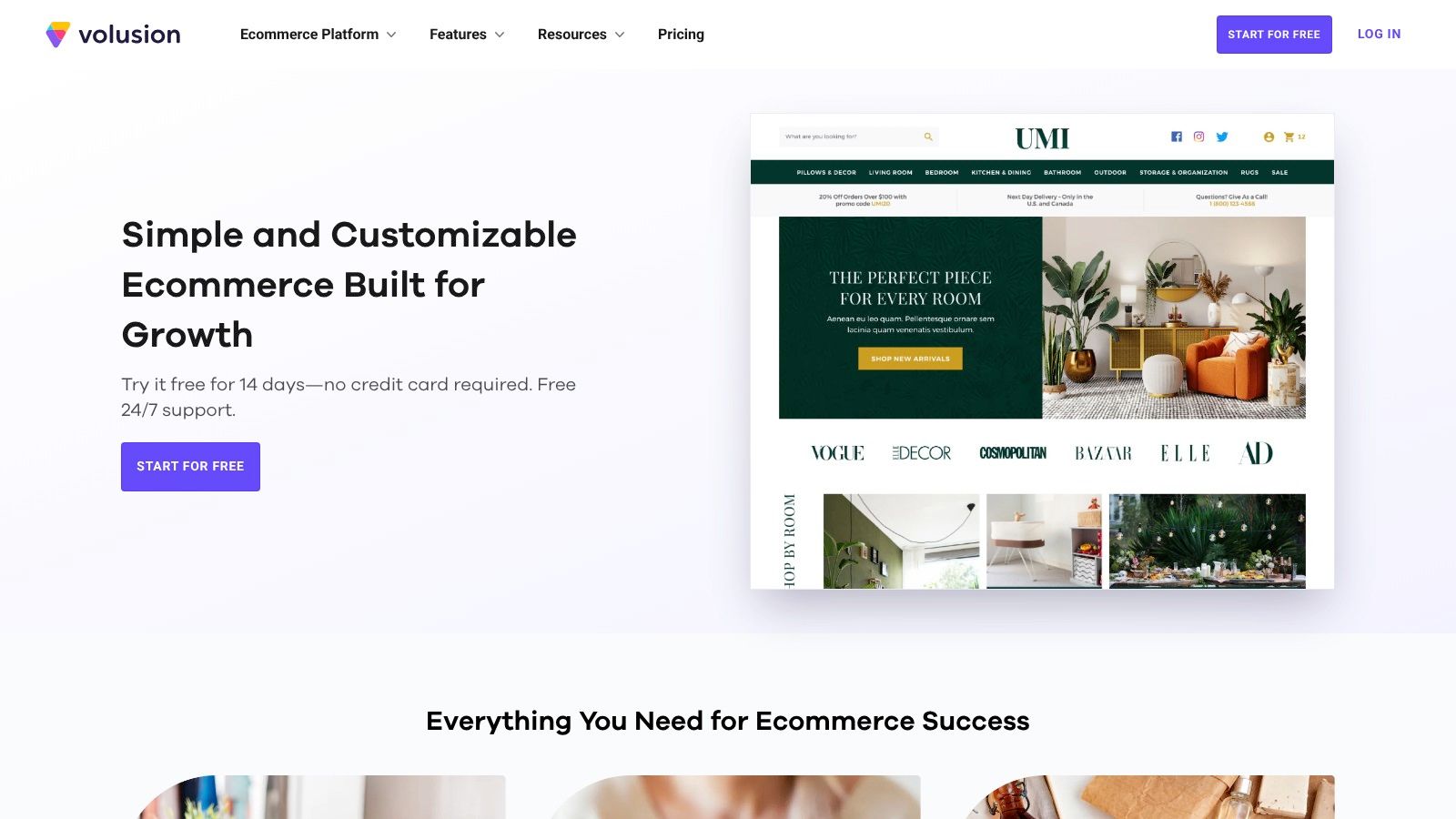
Volusion is a robust all-in-one eCommerce platform designed for businesses that prioritize efficient inventory management and a straightforward setup. Its transparent pricing tiers and no-transaction-fee model are especially attractive for data-driven retailers and TikTok Shop sellers keeping a close eye on profits. While Volusion may not have the extensive app ecosystem of Shopify or the design flexibility of some competitors, its simplicity and built-in features make it a compelling option, particularly for eCommerce newcomers.
Volusion offers four pricing tiers for annual billing:
-
Personal ($35/month): Ideal for startups and very small businesses with annual sales up to $50,000.
-
Professional ($79/month): Suitable for growing businesses with annual sales up to $100,000. This tier unlocks helpful features like abandoned cart recovery.
-
Business ($299/month): Designed for established businesses scaling their operations with annual sales up to $500,000. It includes priority support and advanced reporting.
-
Prime (Custom Pricing): This tier caters to high-volume businesses requiring tailored solutions and enterprise-level support.
Key Features & Benefits
Volusion offers a range of features designed to streamline eCommerce operations:
-
No Transaction Fees: Maximize profit margins on any plan. This is a key benefit for TikTok Shop sellers tracking profitability.
-
Unlimited Products: List as many products as your business requires, allowing for growth and scalability.
-
Built-in SEO & Marketing Tools: Improve online visibility and attract customers with integrated SEO and marketing features.
-
Comprehensive Inventory Management: Volusion's robust inventory tracking and management system is ideal for data-driven retailers.
-
Integrated Shipping & Tax Calculation: Simplify fulfillment with automated tools for shipping labels and tax calculations.
-
CRM Tools: Manage customer interactions and nurture relationships with integrated CRM functionalities.
Pros and Cons
Here's a quick overview of Volusion's advantages and disadvantages:
Pros:
- Transparent pricing without hidden transaction fees.
- All-in-one platform with included hosting, making setup simple and easy.
- Powerful inventory management capabilities.
- Built-in tax calculation tools.
Cons:
- Annual sales limits tied to each plan may require upgrades as your business grows. Carefully consider your projected growth trajectory.
- A smaller app ecosystem compared to competitors like Shopify or BigCommerce may limit third-party integrations.
- Template designs could be considered less modern. While functional, they may require customization for unique branding.
- Limited blogging functionality may restrict content marketing strategies.
Implementation Tips
To get the most out of Volusion, consider these tips:
- Carefully assess your current and projected sales to select the appropriate pricing tier.
- Utilize the built-in SEO tools to optimize product listings and improve search engine rankings.
- Leverage the inventory management features to monitor stock levels and prevent stockouts.
Comparison with Similar Tools
Compared to platforms like Shopify, Volusion offers a simplified setup with a strong emphasis on inventory management. However, Shopify provides a broader app ecosystem and more design flexibility. BigCommerce offers similarly robust features, but its pricing structure can be more complex.
Website: https://www.volusion.com
Volusion presents an excellent choice for eCommerce entrepreneurs, particularly those focused on inventory control and an easy setup. Its transparent pricing and absence of transaction fees are especially appealing to profit-driven TikTok Shop sellers and data-focused retailers. While its design flexibility and app ecosystem may not be as extensive as some competitors, its core functionality makes it a viable option in the eCommerce platform market.
8. Salesforce Commerce Cloud
Salesforce Commerce Cloud (formerly Demandware) is a robust platform designed for enterprise-level ecommerce. It's built to handle high-volume businesses. While the high cost may not be ideal for the average TikTok Shop seller or new ecommerce entrepreneur, it's a powerful solution for established retailers. Data-driven businesses and digital marketing professionals looking to significantly scale their operations will find it particularly useful.
Commerce Cloud is a good fit for businesses migrating from other enterprise platforms or experiencing rapid growth. It provides an all-in-one solution for managing complex ecommerce operations.
Pricing and Cost Considerations
Salesforce Commerce Cloud uses a customized, revenue-sharing pricing model. Annual costs typically start between $150,000-$300,000, depending on your Gross Merchandise Value (GMV) and sales volume. This generally includes a percentage of sales (0.5-2%) plus base licensing fees. Due to this structure, it represents a substantial investment and is best suited for businesses with significant existing revenue.
Features and Benefits for Ecommerce
Commerce Cloud offers a comprehensive suite of features for complex online businesses:
- AI-powered personalization: Deliver targeted product recommendations and personalized promotions. Optimize search results to enhance conversion rates and customer lifetime value. This is especially valuable for data-driven retailers wanting to improve marketing ROI.
- Omnichannel capabilities: Create a seamless experience across different platforms. This includes web, mobile, social media, and physical stores. This feature supports businesses working with TikTok Shop and other social commerce platforms.
- Salesforce ecosystem integration: Leverage the power of Salesforce's Marketing, Service, and Sales Clouds for a complete view of the customer journey. Businesses already using Salesforce will find this integration beneficial.
- Global expansion tools: Easily expand into new markets using features like multi-currency support and localization options. This is essential for businesses targeting international growth.
- Advanced catalog management: Manage even the most complex product catalogs with robust merchandising tools.
Pros and Cons of Salesforce Commerce Cloud
Here's a breakdown of the advantages and disadvantages:
Pros:
- Enterprise-grade performance: Handle high traffic and complex transactions easily.
- Comprehensive capabilities: Manage all aspects of your online business from a single platform.
- Omnichannel support: Provide a consistent brand experience across all touchpoints.
- Powerful AI and analytics: Access actionable insights to optimize your business.
Cons:
- High cost: May be too expensive for smaller businesses and startups.
- Complex implementation: Requires significant technical expertise and resources.
- Long implementation timeline: Expect a 4-9 month implementation period.
- Revenue-sharing model: Can become expensive as sales increase.
Implementation Tips for Success
- Certified implementation partner: Working with a certified Salesforce implementation partner is essential for a smooth launch.
- Define business requirements: Clearly outline your business needs and objectives to ensure the platform meets your specific goals.
- Testing and training: Allocate sufficient time and resources for testing and training to maximize the platform's effectiveness.
Website and Further Information
https://www.salesforce.com/products/commerce-cloud/
Salesforce Commerce Cloud is a significant investment. However, the powerful features and scalability make it a worthwhile option for high-growth businesses ready to expand their ecommerce operations. Its integration with the Salesforce ecosystem offers a significant advantage for companies already using Salesforce tools. Smaller businesses and startups may want to consider more budget-friendly platforms.
9. Shopware
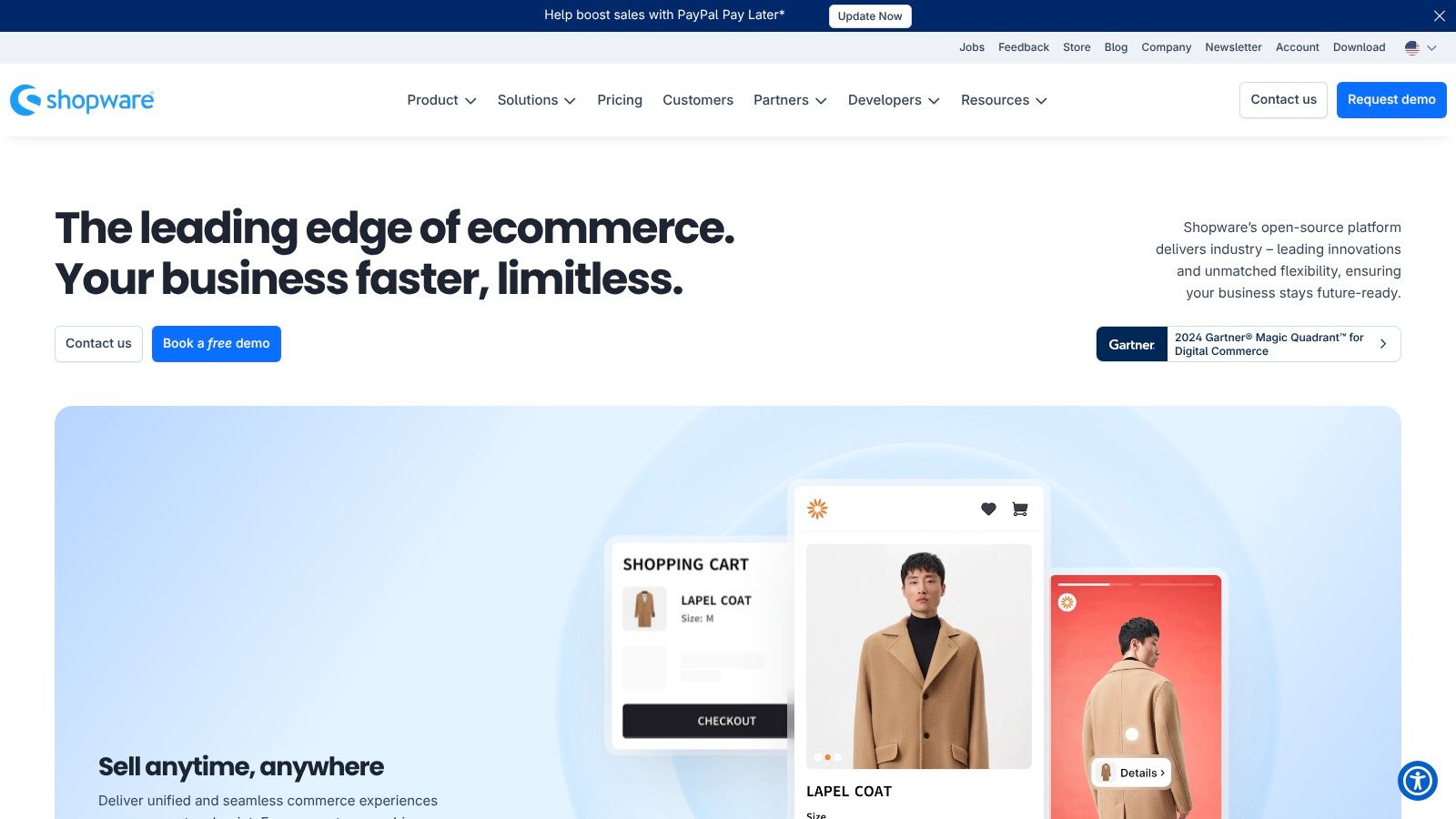
Shopware is a compelling ecommerce platform known for its flexible pricing, robust content management, and API-first approach. These features make it an attractive option for various online businesses, especially those prioritizing brand storytelling and a sophisticated customer experience. While particularly popular in Europe, Shopware's global presence is growing, presenting a compelling alternative to more established platforms.
Shopware offers a range of pricing tiers to accommodate different budgets and business needs. These range from the free and open-source Community Edition to powerful commercial options. This tiered structure allows businesses to start small and scale as they grow. The paid plans, which include Professional at €199/month, Performance at €499/month, and Enterprise with custom pricing, offer hosting, regular updates, and technical support. This simplifies maintenance and ensures access to the latest features.
Key Features and Benefits
Shopware offers a variety of features designed to enhance the customer experience and streamline business operations. Here are a few key highlights:
-
Shopping Experiences: This feature allows you to create rich, engaging shopping experiences through advanced content management and compelling storytelling. Imagine interactive product presentations, shoppable videos, and personalized landing pages, all designed to resonate with your target audience. This is particularly valuable for TikTok Shop sellers and ecommerce entrepreneurs.
-
Advanced Rule Builder: Automate promotions, personalize content, and segment your audience based on various criteria. The advanced rule builder provides data-driven retailers with granular control over their marketing and sales strategies.
-
B2B Suite: For businesses engaged in B2B sales, the dedicated B2B suite provides features like tiered pricing, custom catalogs, and specific workflows designed to optimize wholesale operations.
-
Headless Commerce: The API-first architecture allows for seamless integration with virtually any frontend system. This gives you the flexibility to create custom storefronts, mobile apps, and even connect with emerging platforms like TikTok Shop. This is a significant advantage for digital marketing professionals and early adopters.
-
ERP Integration: Connect with existing Enterprise Resource Planning (ERP) systems to streamline operations and improve data flow across your business. This integration enhances efficiency and provides a more holistic view of your business data.
Pros and Cons of Using Shopware
Like any platform, Shopware has its advantages and disadvantages.
Pros:
-
Content Management and Storytelling: Shopware excels at enabling engaging narratives and visually compelling shopping experiences.
-
Free Open-Source Option: The Community Edition provides a low-risk entry point for businesses to explore the platform's capabilities.
-
Modern Technology Stack: The API-first architecture provides flexibility and scalability for future growth and integrations.
-
European Market Strength: Shopware enjoys a strong presence and support network within European markets.
Cons:
-
Smaller Ecosystem: Shopware has a smaller ecosystem of extensions compared to more established platforms, potentially limiting integrations and customizations.
-
North American Market Recognition: Shopware has less recognition and support in North American markets.
-
Learning Curve: Leveraging Shopware's advanced features may require some technical expertise.
-
Commercial Licenses: Access to some of the most powerful features, such as the B2B suite, requires a paid subscription.
Implementation Tips
Here are a few tips to help you get started with Shopware:
-
Start with the Community Edition: Familiarize yourself with the platform using the free version before committing to a paid plan.
-
Explore Resources: Utilize Shopware’s extensive documentation and community forums for guidance and support.
-
Consider Expert Assistance: For complex implementations involving custom development or integrations, consider hiring a Shopware expert.
Website: https://www.shopware.com
Shopware provides a compelling alternative for businesses looking for a flexible and powerful ecommerce platform with a focus on content and customer experience. While it may not be the ideal solution for everyone, its unique strengths make it a platform worth considering, particularly for those who value engaging storytelling and a modern, API-first approach.
10. PrestaShop
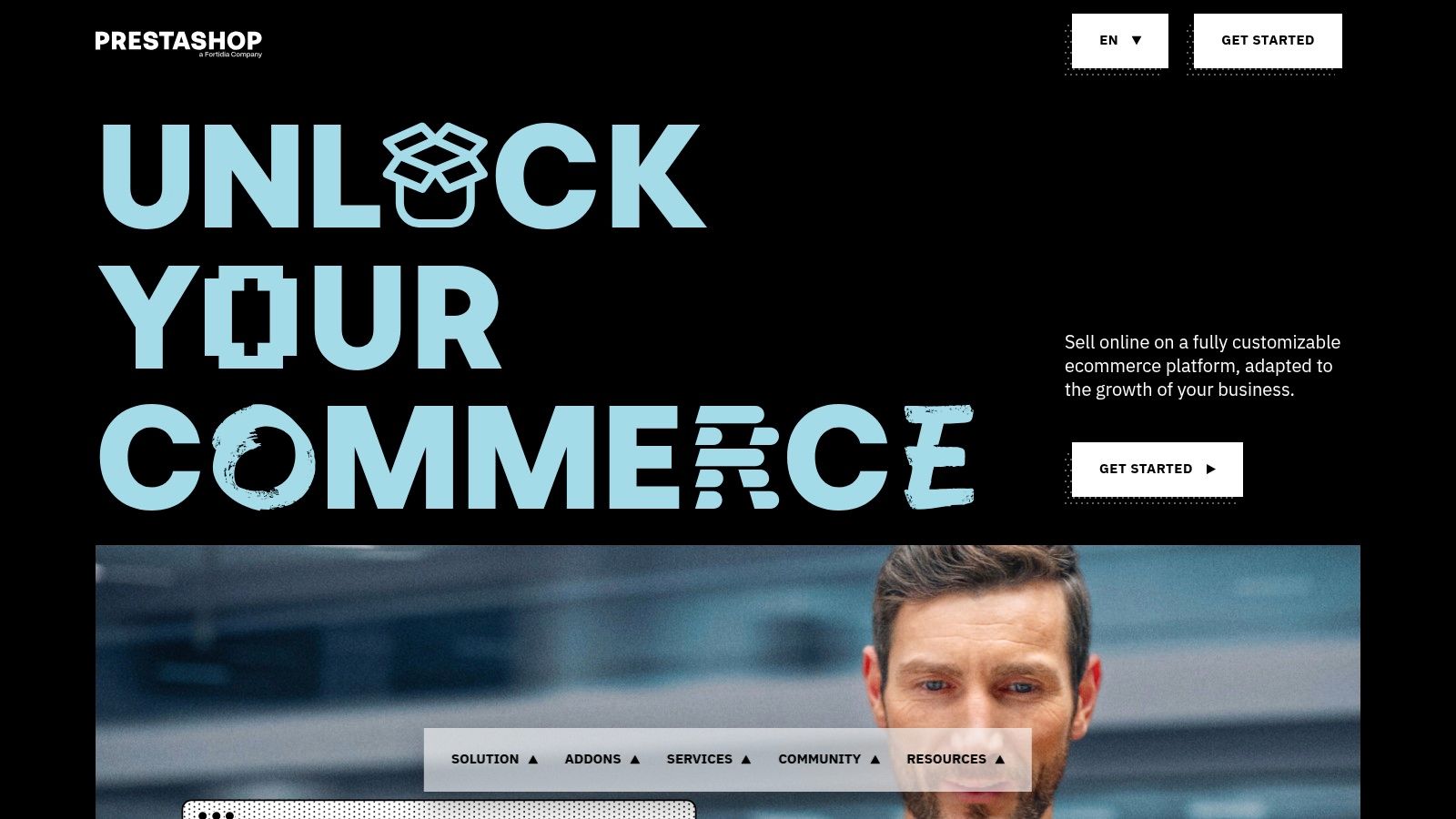
PrestaShop is a powerful, flexible, and budget-friendly eCommerce platform. It's particularly attractive to technically inclined entrepreneurs and those focused on international sales. Unlike hosted platforms, PrestaShop is open-source. This gives you more control and eliminates recurring licensing fees, a major plus for cost-conscious businesses. However, it does require a willingness to invest time in setup and maintenance.
This platform is a particularly good fit for data-driven retailers and digital marketing professionals comfortable managing their own technical backend.
Pricing and Costs
While the PrestaShop software itself is free, it's important to budget for associated costs. Here's a general overview:
- Hosting: $3-$100/month (depending on traffic and storage)
- Domain Registration: $10-$20/year
- Themes: $0 (free themes) – $200+ (premium themes)
- Modules/Extensions: $0 (free modules) – $300+ each (premium modules)
- Developer Costs: Variable, depending on customization needs
Features
PrestaShop offers a range of features designed to support online businesses:
- Free Open-Source Core Software: Download, install, and customize PrestaShop to meet your specific needs.
- Extensive Marketplace: Access over 3,000 modules and themes to extend functionality for marketing, payments, shipping, and more.
- Multi-Language and Multi-Currency Support: PrestaShop is built for international sellers targeting global markets, a crucial feature for those expanding their reach on platforms like TikTok Shop.
- Built-in Tools: Simplify back-end processes with integrated tax management and a shipping calculator.
- Advanced Product Management: Easily manage product variations like size, color, and other specifics.
Pros
- No Monthly Fees: Enjoy significant cost savings compared to SaaS platforms.
- International Selling Capabilities: PrestaShop simplifies global eCommerce setup.
- Large Community and Marketplace: Find solutions and support within a large community and extensive marketplace.
- Lighter Server Requirements: Potentially reduce hosting costs compared to some alternatives.
Cons
- Technical Maintenance Required: PrestaShop requires separate hosting and technical maintenance, which may be challenging for users without technical skills.
- Extension Costs: While free options exist, high-quality extensions often come with a significant cost.
- Admin Interface: The admin interface may be less intuitive than some hosted platforms, leading to a steeper learning curve.
- Manual Security and Updates: Ongoing attention and technical expertise are needed to manage security and updates.
Implementation and Setup Tips
- Reliable Hosting: Choose a hosting provider specializing in PrestaShop for optimal performance.
- Theme Selection: Start with a free or affordable theme before investing in premium options.
- Essential Modules: Carefully select essential modules and avoid overspending on unnecessary extensions initially.
- Testing: Thoroughly test all features and integrations before launching your store.
- Developer Assistance: Consider hiring a developer for complex customizations if you lack technical expertise.
Comparison
PrestaShop offers greater control and lower recurring costs than platforms like Shopify but demands more technical involvement. If you're comfortable managing your own server and updates and prioritize customization, PrestaShop is a strong choice. If you prefer a simpler, fully hosted solution, Shopify might be a better fit. PrestaShop is an excellent option for data-driven retailers and early adoption beta testers seeking granular control.
Website: https://www.prestashop.com
Top 10 Ecommerce Platform Pricing Comparison
| Platform | Core Features ★ | User Experience 🏆 | Value Proposition 💰 | Unique Selling Points ✨ | Target Audience 👥 |
|---|---|---|---|---|---|
| Shopify | Tiered plans; 6k+ apps; responsive themes; multi-channel selling | User-friendly; reliable uptime | All-in-one solution with scalable options | Extensive ecosystem | Beginners to mid-sized businesses |
| WooCommerce | Open-source; seamless WP integration; flexible extensions | Customizable but requires technical know-how | Low core cost with full store control | Robust community & SEO tools | Budget-conscious technical users |
| BigCommerce | Built-in SEO; unlimited products; integrated marketing tools | Robust, secure, enterprise-ready | No transaction fees; feature-rich out of the box | Many built-in features | Growing mid-to-large stores |
| Magento (Adobe Commerce) | Highly customizable; advanced catalog & multi-store management | Powerful yet complex | Comprehensive enterprise capabilities | Ultimate flexibility & scalability | Mid-to-large enterprises |
| Wix eCommerce | Drag-and-drop builder; secure online payments; mobile-optimized templates | Extremely intuitive and visually appealing | All-in-one simplicity with hosting included | Elegant design & ease-of-use | Small businesses & entrepreneurs |
| Squarespace Commerce | Designer templates; integrated POS; built-in tax and shipping tools | Sleek, minimal learning curve | Inclusive hosting with professional features | Award-winning aesthetics | Creative professionals & SMBs |
| Volusion | Inventory management; responsive themes; integrated shipping | Straightforward and reliable | No transaction fees; clear pricing tiers | Strong inventory focus | Small to mid-sized merchants |
| Salesforce Commerce Cloud | AI-powered personalization; omnichannel integration; deep CRM connectivity | Enterprise-grade experience | Robust analytics with full ecosystem integration | AI power & massive scalability | Large enterprises |
| Shopware | Open-source/commercial; advanced content management; API-first architecture | Modern and flexible | Flexible pricing with storytelling commerce | Unique “Shopping Experiences” feature | European mid-to-large businesses |
| PrestaShop | Open-source; extensive modules; multi-language/multi-currency support | Functional with a DIY setup approach | No licensing fees with cost-effective expansion | International focus & flexibility | Small to medium-sized businesses |
Making The Right Choice For Your Business
Choosing the right ecommerce platform requires a careful evaluation of features, functionality, and cost. Whether you're drawn to the robust features of Shopify, the open-source flexibility of WooCommerce, the scalability of BigCommerce, or the enterprise-grade solutions of Magento, Salesforce Commerce Cloud, or Shopware, the ideal platform should align perfectly with your specific business needs. Consider factors like transaction fees, hosting expenses, the need for add-ons or plugins, and the ongoing maintenance required.
For smaller businesses, platforms like Wix eCommerce, Squarespace Commerce, Volusion, or PrestaShop might offer the right balance of simplicity and functionality.
If you anticipate rapid growth or require extensive customization, a more robust platform like Magento or Salesforce Commerce Cloud could be a better fit.
Implementation and Integrations
Implementation is another key consideration. Some platforms offer simple drag-and-drop interfaces, while others require coding knowledge or the assistance of a developer. Consider your internal resources and technical expertise when evaluating different options. Integrations and compatibility with your existing tools – such as your CRM, marketing automation platform, or inventory management system – are also crucial for a streamlined workflow. Ensure your chosen platform can seamlessly connect with the tools you rely on.
Budget and Future Growth
Your budget plays a significant role in the decision-making process. While some platforms offer free trials or basic plans, scaling your business often requires upgrading to more expensive tiers with advanced features. Factor in not just the monthly or annual subscription fees, but also transaction fees, app costs, and potential development expenses. A thorough cost analysis will help you determine the true cost of ownership and choose a platform that fits within your financial resources.
Finally, consider the future of your business. Choosing a platform that can scale with your growth is paramount. Think about your projected sales volume, product expansion plans, and potential internationalization efforts. Selecting a platform that can accommodate these future needs will prevent costly migrations and disruptions later on.
By carefully considering these factors and comparing pricing models, you can choose the ecommerce platform that best positions you for success in the competitive online retail landscape, especially when selling on platforms like TikTok Shop.
Optimize Your TikTok Shop Performance With Mergoio
Ready to enhance your TikTok Shop sales and profit tracking? Mergoio offers highly detailed real-time analytics, SKU-level insights, and predictive cost forecasting for affiliates, taxes, and shipping, empowering you to maximize your profitability. As an early adopter, you'll benefit from exclusive beta program perks, influencing product development and receiving priority support. Replace guesswork with data-driven decisions and gain deeper insight into your TikTok Shop performance (with Amazon integration coming soon!). Explore the power of Mergoio today and optimize your eCommerce success: https://mergoio.com

Leave a Reply